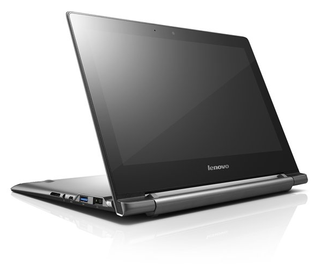Intel Unveils New Core i3, Celeron-powered Chromebooks
Intel's new chips mean users will be able to get as many as 11 hours of battery from their Chromebooks.
Lenovo and LG whet our appetites in the Chrome OS department this morning, and now Intel is serving up the main course. The company hosted an event today that introduced a new line of Chrome devices featuring its 4th generation Core i3 processor as well as the first designs using its Bay Trail Celeron chips.

"Intel has grown to become the No. 1 microprocessor in Chrome systems," Navin Shenoy said in a statement today. "We've been working on five generations of Chrome and after Google, Intel is the largest contributor to the Chromium OS. Intel chips are the first and only to support 64-bit Chrome OS. This deep history and investment combined with our stellar Bay Trail and Haswell SoCs mean Intel can offer the best performing devices at every price point in the Chrome category. When people are shopping for Chrome devices, they should look for Intel Inside."
Chromebooks based on Intel's 4th generation Core i3 chip will start at $349 and include Dell's newly announced Core i3-powered version of the Chromebook 11. Acer also has a new C720 Chromebook powered by Core i3, which it says will be available early in the back-to-school season.
More: Lenovo's New Chromebook Features 300-degree Hinge
On the Celeron side, alongside Lenovo's new N20 and N20p Chromebooks for consumers, Asus also announced two new Chromebooks that will ship this summer. Intel describes the 11.6-inch C200 and 13.3-inch C300 as devices for both consumers and students, which hopefully means that you don't have to be a part of a Chromebook program through a university or school. Instead, it sounds like these laptops will be available in stores as well as through educational programs. There's also HP's freshly announced Chromebox, which will be available in the U.S. in June.
More: LG Chromebase All-in-One Chrome OS Desktop Coming Soon
Certainly, Intel's powering a lot more Chromebooks compared to just six months ago. In fact, the company said today's announcement put it as the number one microprocessor provider in Chrome OS systems with a total of 20 designs in the market or on the way to market later in the year. This is up from just four models in September of last year.
Stay on the Cutting Edge
Join the experts who read Tom's Hardware for the inside track on enthusiast PC tech news — and have for over 25 years. We'll send breaking news and in-depth reviews of CPUs, GPUs, AI, maker hardware and more straight to your inbox.
Follow Jane McEntegart @JaneMcEntegart. Follow us @tomshardware, on Facebook and on Google+.
-
pyoverdin Can someone state the primary purpose of chromebooks? Are they issued by corporations/government to employees?Reply
I don't see how they could beat a conventional and similarly priced notebook in practicality or value in personal use. -
RupertJr I really don't see the point of buying this over a real notebook. Such a limited OS... The only reason I would buy it is if it's possible to drop Chrome OS and install Ubuntu or windows. Who on earth buys this kind of stuff?Reply -
WithoutWeakness ReplyCan someone state the primary purpose of chromebooks? Are they issued by corporations/government to employees?
They're cheap, have decent battery life, and are generally built better than Windows notebooks in the same price range. A Windows OEM license adds $15-$50 to the cost of a Windows notebook where ChromeOS is free. In order to drive Windows notebooks down into the price range of Chromebooks manufacturers have to cut corners with things like cheaper materials, weaker batteries, and lower-quality screens to save that $15-$50.
I don't see how they could beat a conventional and similarly priced notebook in practicality or value in personal use.
For people who just want to connect to the internet, watch videos, browse social media, and other similar activities a Chromebook is all they need. A tablet can perform the same duties with similar battery life but Chromebooks have larger screens and built-in keyboards which are important to most people. -
dotaloc ^^ thisReply
Plus, arguably, the "feature" of less malware-threat (at the cost of less overall capability) could be beneficial to many users. The cloud-nature also decreases the need for a backup soluton, which many users seem to neglect. -
iceTorch Although it wont replace the power of a full desktop, it fulfills the basic computer use that most people need. I have the Acer C720 chromebook and its lightweight, small, has good battery life, and is powerful enough for basic machine use. It won't play games or video/photo edit as well as Windows but most people don't do that. What I do on my chromebook is web browse, listen to music, watch videos, spreadsheet, documents, slides and I installed ubuntu for so I can code on the go.Reply
My Windows desktop machine fulfills the more heavyweight rolls such as programming, gaming, video/photo editing, etc. -
enterthesloth1 I work at a school district and manage about 2000 computers in a one man shop. They range from ios to chreombooks, to android to windows. I can install software on our 700 chromebooks in 5 minutes from anywhere in the world, they support all of our educational software, need almost no support and are the cheapest solution out there. For schools they are great.Reply
Most Popular

